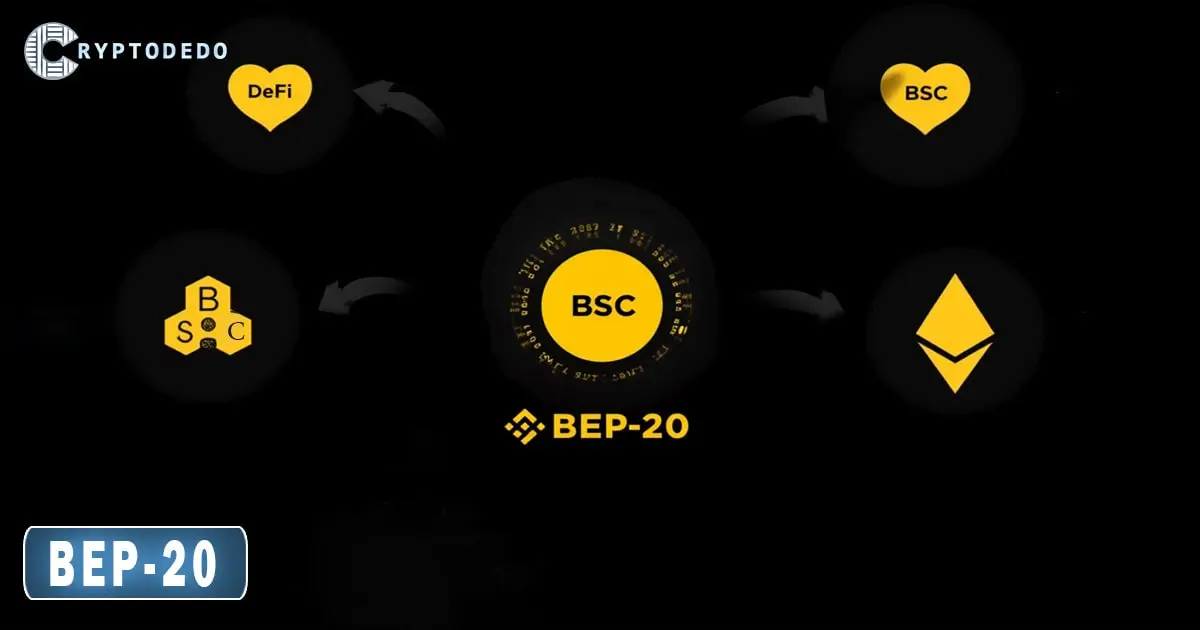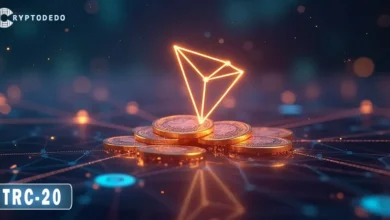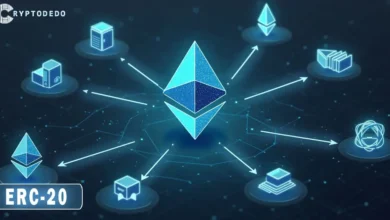BEP-20 on BNB Smart Chain: A Complete Guide
BEP-20 Tokens on BNB Smart Chain: How They Work

Introduction to BEP-20 and BNB Smart Chain
The BNB Smart Chain (BSC) has rapidly become a powerhouse in the blockchain industry, offering developers and users a robust platform with low transaction fees and fast processing times. A significant component of BNB Smart Chain’s success is the BEP-20 standard, a token standard designed to create, manage, and transfer tokens efficiently within the BNB ecosystem. BEP-20 is inspired by Ethereum’s ERC-20, providing familiar functionality with added benefits tailored to the needs of high-performance applications. From decentralized finance (DeFi) protocols to gaming and NFTs, BEP-20 has opened up new possibilities for innovation on BNB Smart Chain, attracting projects and users alike. In this article, we explore the fundamentals of BEP-20, its technical structure, advantages, applications, and future role within the growing ecosystem of BNB Smart Chain.
What is BEP-20?
BEP-20 is a technical standard that defines how tokens operate on BNB Smart Chain. Similar to Ethereum’s ERC-20 standard, BEP-20 enables developers to create fungible tokens, allowing seamless interaction within the BNB Smart Chain ecosystem. BEP-20 provides a framework for token functionalities such as balance checks, transfers, and approvals, making it versatile for different types of projects, from DeFi applications to gaming.
History and Development of the BEP-20 Standard
The BNB Smart Chain, originally launched as Binance Smart Chain in 2020, was created to complement Binance’s existing blockchain, Binance Chain, by adding support for smart contracts. In early 2022, the network was officially renamed to BNB Smart Chain to emphasize its decentralization and community-driven nature, with BNB representing “Build and Build.” The development of the BEP-20 standard on BNB Smart Chain aimed to create a parallel standard to Ethereum’s ERC-20 but with added benefits, such as lower fees and higher transaction speeds. This compatibility with ERC-20 allowed projects to transition from Ethereum to BNB Smart Chain easily, contributing to the rapid adoption of BEP-20 tokens.
Key Features and Specifications of BEP-20
BEP-20 has several defining features that make it appealing to developers:
- ERC-20 Compatibility: BEP-20 was designed to closely resemble ERC-20, enabling straightforward transitions from Ethereum to BNB Smart Chain.
- Low-Cost, Fast Transactions: BNB Smart Chain’s PoSA (Proof of Staked Authority) mechanism ensures rapid, affordable transactions, ideal for high-frequency use cases.
- Flexibility for Token Types: BEP-20 supports various token categories, including stablecoins, utility tokens, and governance tokens.
- Cross-Chain Support: BEP-20 tokens can be transferred seamlessly between BNB Chain and BNB Smart Chain, providing more utility and flexibility for users.
BEP-20 vs. ERC-20: A Comparison of Token Standards
Though BEP-20 and ERC-20 share similarities, there are key differences:
- Transaction Fees: BEP-20’s fees on BNB Smart Chain are significantly lower than ERC-20’s on Ethereum, making it cost-effective for high-frequency transactions.
- Transaction Speed: BNB Smart Chain’s PoSA consensus model offers faster transactions compared to Ethereum’s PoW or PoS models.
- Centralization: BNB Smart Chain is relatively more centralized than Ethereum, relying on a smaller number of validators, which may concern users who prioritize decentralization.
- Cross-Chain Transfers: BEP-20 tokens can move easily between BNB Chain and BNB Smart Chain, while ERC-20 relies on third-party solutions for cross-chain transfers.
How to Create Your Own Token on BNB Smart Chain
Step 1: Getting Started with Bitbond’s Token Tool
- Visit the Bitbond Website: Open your web browser and navigate to Bitbond’s website.
- Access the Token Tool: Once on the website, locate and click on the Token Tool option. This tool simplifies the process of creating and managing tokens on multiple blockchains, including BNB Smart Chain (BSC).
- Connect Your Wallet: Click the Connect Wallet button at the top right corner. Ensure that your wallet (such as MetaMask) is configured to connect to BNB Smart Chain. Connecting your wallet allows you to deploy and manage your token contract on the blockchain.
Step 2: Configuring Token Basics and Settings
Once connected, you’ll be directed to the Token Creation Interface. Here’s how to proceed with configuring your BEP-20 token:
- Choose Token Type: Select between DeFi Token and Security Token depending on your project requirements. For most general uses, choose “DeFi Token.”
- Basic Settings:
- Token Name: Enter the name of your token (e.g., “MyToken”).
- Symbol: Define a symbol for your token (e.g., “MTK”).
- Initial Supply: Specify the total initial supply of tokens.
- Decimals: Typically set to 18 to allow fractional ownership.
- Custom Contract Name (Optional): Optionally, set a unique contract name.
- Token Configuration:
- Can Burn: Enable to allow token burning, reducing the total supply.
- Can Mint: Allows the minting of additional tokens beyond the initial supply.
- Set Total Supply Cap: Establishes a maximum cap on the token supply.
- Charge Transaction Tax/Fee: Adds a fee to each transaction, which can support rewards or project funding.
- Apply Burn Fee (Deflationary Token): Automatically burns a portion of each transaction.
- Apply Holder Rewards (Reflection Token): Rewards token holders by distributing a portion of transaction fees.
- Change Owner: Allows for transferring ownership of the token contract to another wallet.
- Documentation and Guidelines: Bitbond provides documentation links for detailed guidance on each feature.
Step 3: Testing and Deploying the Token
After configuring your token, proceed to testing and deployment:
- Testing the Smart Contract:
- Remix IDE Testing Environment: Test your token’s core functions (e.g., transfers) in Remix IDE’s simulation environment.
- BSC Testnet: Deploy the token on the BSC Testnet using MetaMask to ensure functionality without spending real BNB.
- Deploying to the Mainnet:
- Switch MetaMask to the Mainnet: Set MetaMask to connect to BNB Smart Chain’s mainnet.
- Compile and Deploy: In Remix, compile and deploy your contract to the mainnet, which will require BNB for gas fees.
Step 4: Verifying and Publishing the Contract
- Verification on BscScan: After deployment, verify the contract on BscScan to increase transparency and credibility.
- How to Verify: Locate your contract on BscScan, paste the contract code, and select the appropriate compiler version.
Managing Your Token on Bitbond’s Token Tool
After creating your token, you can manage it using Bitbond’s Manage Token interface. Here’s a detailed look at the management options available:
1. Create Liquidity Pool
- Purpose: Creating a liquidity pool is essential for making your token tradeable on decentralized exchanges (DEXs). This pool helps facilitate smoother transactions and establishes a market for your token.
- How to Use: Enter the token contract address and set up a pool where users can buy and sell your token with ease.
2. Mint Additional Tokens / Burn Tokens
- Minting: This option allows you to mint (create) additional tokens beyond the initial supply. This is useful if your project requires more tokens in the future for distribution or growth.
- Burning: Permanently removes tokens from circulation, reducing the total supply. Burning tokens is often done to increase scarcity, which can potentially enhance the token’s value.
3. Change Token Owner or Renounce Ownership
- Change Ownership: Transfer ownership of the token contract to another wallet or entity. This is particularly useful for projects that are handed over to another team or management.
- Renounce Ownership: This option allows the original creator to give up control over the contract, enhancing decentralization and assuring users that no single entity can alter the contract once renounced.
4. Pause and Unpause, Manage Whitelist and Blacklist
- Pause and Unpause: Temporarily disable or enable token transfers. This can be useful for maintenance or security situations.
- Whitelist and Blacklist Management: Define which addresses are allowed (whitelist) or restricted (blacklist) from holding or transferring the token. This feature is commonly used to comply with regulatory requirements or to exclude specific accounts from token transactions.
5. Works with All Tokens Created with Token Tool
- Compatibility: All tokens created using Bitbond’s Token Tool are compatible with these management features, simplifying token management tasks for users.
6. Manage Token Product Documentation
- Documentation: Bitbond provides comprehensive documentation to guide users through each function, ensuring they understand the available options and make informed decisions regarding token management.
To begin managing your token, enter your Token Contract Address in the provided field and click Continue. If you haven’t created a token yet, there’s an option to get started by clicking Create Token.
Additional Tips for Managing a BEP-20 Token
- Audits: For tokens intended for a large audience or used in DeFi applications, consider a security audit from reputable firms like CertiK or Quantstamp to identify and resolve any potential vulnerabilities.
- Tokenomics and Distribution: Develop a clear tokenomics plan, including strategies for distribution, staking, governance, or rewards.
- Updating and Expanding: While BEP-20 contracts are immutable, you can add features over time by creating additional smart contracts or governance mechanisms.
By following these steps and utilizing the Token Tool by Bitbond, developers can easily create, deploy, and manage a customized BEP-20 token on BNB Smart Chain. This tool provides a comprehensive, user-friendly solution for creating tokens suited to various applications, including DeFi, rewards, and community incentives, while enabling ongoing management and flexibility for the token’s lifecycle.
Popular Use Cases for BNB Smart Chain Tokens
Tokens on BNB Smart Chain have diverse applications, making them an essential part of its ecosystem:
- DeFi Applications: BEP-20 tokens play a critical role in decentralized finance (DeFi) on BNB Smart Chain. They are commonly used for staking, lending, and providing liquidity in pools. Through staking, users can lock up their tokens to support network security and receive rewards in return. In lending protocols, BEP-20 tokens can be used as collateral, allowing users to borrow other assets while retaining ownership of their tokens. Liquidity pools, a core component of decentralized exchanges, use BEP-20 tokens to facilitate trading and enable users to earn fees by contributing their tokens to the pool.
- Governance Tokens: Many projects on BNB Smart Chain utilize governance tokens to foster community participation in decision-making. Holders of these tokens can vote on protocol changes, such as upgrades, parameter adjustments, and fund allocations. This decentralized governance model allows token holders to have a voice in shaping the project’s future, creating a more democratic and community-driven ecosystem. BEP-20 governance tokens have become popular, especially in projects that prioritize user input and transparency.
- Rewards and Incentives: BEP-20 tokens are widely used as rewards in various applications, such as gaming, yield farming, and staking. In blockchain gaming, players can earn BEP-20 tokens as rewards for achievements or participation, creating a play-to-earn environment. Yield farming, a popular DeFi strategy, allows users to earn rewards by providing liquidity or staking tokens across multiple protocols. By incentivizing engagement with tokens, BNB Smart Chain projects can attract and retain users, enhancing activity and liquidity in their ecosystems.
How BNB Smart Chain Tokens Power DeFi Applications
With low transaction fees and high processing speed, BNB Smart Chain is an ideal choice for DeFi applications. BEP-20 tokens enable efficient lending, borrowing, staking, and liquidity provision. By offering affordable transaction costs, BNB Smart Chain attracts users who may find fees on other blockchains, like Ethereum, prohibitive.
In lending and borrowing, BEP-20 tokens act as both assets and collateral. Liquidity mining and yield farming are also popular within the ecosystem, with BEP-20 tokens enabling users to stake in liquidity pools for rewards.
Cross-Chain Compatibility of Tokens on BNB Smart Chain
One of the standout features of BNB Smart Chain tokens is their cross-chain compatibility with BNB Chain. This allows users to transfer tokens seamlessly across both chains, providing more flexibility and utility, especially for applications requiring liquidity from multiple sources.
Advantages and Disadvantages of BNB Smart Chain Tokens
Advantages:
- Fast and Affordable Transactions: Ideal for frequent, low-cost transfers.
- Broad Support and Compatibility: The similarity to ERC-20 promotes compatibility across exchanges and wallets.
- Cross-Chain Flexibility: Easy movement of assets between BNB Chain and BNB Smart Chain.
Disadvantages:
- Centralization: BNB Smart Chain’s reliance on fewer validators reduces its decentralization.
- BNB Dependency: Transaction fees require BNB, subjecting users to its price fluctuations.
The Role of BNB in BNB Smart Chain Transactions and Fees
In the BNB Smart Chain ecosystem, BNB (Binance Coin) serves as the primary currency for transaction fees and network operations. Here’s how BNB functions within the ecosystem:
- Transaction Fees: BNB is used to pay transaction fees on BNB Smart Chain, incentivizing validators to secure the network.
- Staking and Validators: Validators stake BNB as collateral, supporting network stability.
- Gas Fees for dApps: BNB acts as “gas” to power decentralized applications on BNB Smart Chain.
Future of BNB Smart Chain Tokens
As BNB Smart Chain continues to expand, its tokens are poised to become even more influential within the blockchain ecosystem, particularly in areas like decentralized finance (DeFi), gaming, and NFTs. BNB Smart Chain (BSC) has established itself as a cost-effective and efficient platform, and the popularity of BEP-20 tokens reflects its appeal to developers and users alike. Here are some of the key trends and advancements expected in the future of BNB Smart Chain tokens:
- Enhanced Cross-Chain Interoperability: As blockchain technology evolves, interoperability between chains is becoming increasingly important. Binance has been actively developing cross-chain bridges to connect BNB Smart Chain with other blockchains, including Ethereum and other Layer-1 solutions. This enhanced interoperability will enable assets to move seamlessly across networks, allowing BEP-20 tokens to access greater liquidity and broader utility across DeFi platforms. Cross-chain functionality could also make BNB Smart Chain tokens integral to multi-chain strategies that require flexibility and cross-network interactions.
- Integration with Decentralized Finance (DeFi): BNB Smart Chain has become a popular choice for DeFi projects, offering low transaction fees and fast processing times compared to Ethereum. As DeFi matures, BNB Smart Chain tokens are likely to be increasingly used in lending, borrowing, staking, and yield farming applications. This trend could lead to more sophisticated DeFi products, such as decentralized derivatives, asset management tools, and algorithmic stablecoins, expanding the use cases for BEP-20 tokens and driving further adoption among DeFi enthusiasts.
- Growth in Non-Fungible Tokens (NFTs) and Metaverse Projects: The demand for NFTs and virtual assets in the metaverse is rapidly increasing. BNB Smart Chain’s efficiency and cost-effectiveness make it an attractive platform for NFTs and metaverse-related projects. BEP-20 tokens can play a central role in these ecosystems, providing the foundation for NFT marketplaces, in-game currencies, and assets that can be used across various virtual worlds. With Binance’s support, BNB Smart Chain may become a leading platform for blockchain-based gaming and metaverse projects, enhancing the value and versatility of BEP-20 tokens in the digital asset space.
- Institutional Adoption and Mainstream Integration: As blockchain technology garners more attention from traditional finance and corporate sectors, BNB Smart Chain tokens may see increased adoption by institutional investors. Binance is working to make BNB Smart Chain a scalable and secure network for businesses and enterprises, which could encourage more companies to build on the platform. If Binance succeeds in fostering institutional trust and regulatory compliance, BNB Smart Chain tokens could become widely accepted assets, with potential applications in corporate finance, asset tokenization, and cross-border transactions.
- Advances in Security and Auditing Standards: With the growth of DeFi and NFTs, security has become a major concern. To ensure trust and protect users, Binance is likely to increase efforts to implement more stringent security protocols and support comprehensive auditing processes. This focus on security will strengthen the credibility of BNB Smart Chain tokens, especially in applications involving high-value transactions or sensitive data. Enhanced security standards will also make BNB Smart Chain a more attractive option for developers seeking a safe environment to launch new projects.
- Expansion of Governance Mechanisms: BNB Smart Chain currently has a relatively centralized governance model, but as the ecosystem grows, there may be a push toward more decentralized governance. BNB Smart Chain tokens could play a significant role in this shift by enabling community-driven decisions regarding network upgrades, tokenomics, and platform policies. Decentralized governance models can increase user engagement and attract developers who value autonomy and community involvement.
- Support for Layer-2 Solutions: As demand for BNB Smart Chain increases, there could be a need to implement Layer-2 scaling solutions to handle higher transaction volumes. Layer-2 solutions on BNB Smart Chain would enable faster and cheaper transactions while reducing the load on the main chain, making it even more suitable for applications that require high throughput, such as gaming and real-time finance applications. BEP-20 tokens would directly benefit from these upgrades, gaining even greater utility and efficiency.
- Regulatory Developments and Compliance: Regulatory changes are shaping the future of cryptocurrencies worldwide. Binance has been actively working on establishing compliance frameworks to ensure that BNB Smart Chain remains accessible to users while meeting regulatory requirements. As regulations evolve, BNB Smart Chain tokens could gain legitimacy, attracting more users and institutional players who value compliance. This shift could make BNB Smart Chain tokens more appealing in regions with strict regulations, helping Binance build a compliant, globally accessible ecosystem.
Conclusion
The BEP-20 standard has become essential for projects on BNB Smart Chain, driving adoption through its compatibility, affordability, and high efficiency. With features that mirror ERC-20 and the advantages of BNB Smart Chain’s scalability, BEP-20 has enabled diverse applications. Despite concerns around centralization and BNB dependency, BEP-20 remains a popular choice for developers. As BNB Smart Chain evolves, the role of BEP-20 tokens will likely expand, becoming a cornerstone of mainstream blockchain applications.




